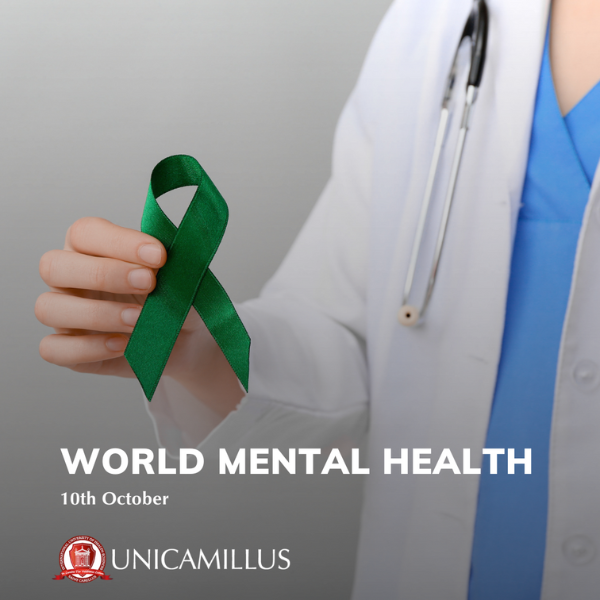The 2023 theme is “Mental Health is a Universal Human Right”. Comments from Professor Chiappini
10 October 2023 will mark the 31st World Mental Health Day, established in 1992 by the World Federation for Mental Health. The aim is to raise awareness of the challenging issue of mental health problems, promoting collective consciousness, in order to overcome taboos and improve the lives of those affected by psychiatric disorders.
Professionals working in the field of psychiatry and mental health can also benefit from the opportunity to share best practices and experiences, as well as discuss treatment options and the efficiency of current treatments. “Mental health is an issue of fundamental importance and this day is an opportunity for reflecting on the issue, raising awareness among people and promoting positive change”, comments Professor Stefania Chiappini, Lecturer in Psychiatry at UniCamillus University.
Mental Health is a Human Right: the 2023 theme
Every year, World Mental Health Day chooses a specific theme. The theme for 2023 is “Mental Health is a Universal Human Right”.
Mental health is a human right for several reasons: the first is the dignity of people affected by mental health problems. It has been 45 years since the so-called Basaglia Law, which provided for the shutdown of psychiatric institutions known as “asylums”: places of despair, characterised as places of social containment, where patients were hospitalised because, according to Lombrosian notions of mental illness, they were considered dangerous to themselves and others, or because they were a public scandal. Broken lives were left to languish in complete isolation from society, with the role of the “mentally ill” being reinforced, further increasing prejudice and stigma.
Thanks to Law 180 of 1978, psychiatric patients are no longer defined by their illness, but as individuals like any other social component, with problems to be solved and not to be marginalised.
The problem arose when society was not ready to replace psychiatric institutions with adequate support centres tailored to the needs of patients, leaving obvious gaps and a burden mainly carried by their families.
A law that lacks widespread social acceptance may face challenges in its implementation, particularly in the context of mental illness, where it is often regarded as something to be avoided and, in extreme cases, condemned.
“People with mental health problems have the same fundamental rights as any other individual”, Chiappini emphasises, “and it is essential to emphasise and defend their right to dignity, care, life, safety, work and education. Psychiatry can contribute to ensuring respect for these rights at several levels: by educating and training mental health professionals, by raising public awareness, by collaborating in the interdisciplinary treatment of patients, and by ensuring that patients and their families are involved in decisions about their care and treatment”.
Discrimination and prejudice are also factors that can exacerbate psychiatric symptoms and delay access to appropriate health services. “The perceived stigma associated with mental disorders can have a negative impact on treatment”, Chiappini explains. “It can manifest itself in different ways, such as delaying or avoiding seeking help, or worsening psychiatric symptoms related to feelings of isolation, shame, despair and low self-esteem. Additionally, it can lead to non-adherence to treatment once started”.
An inclusive society is a better society for everyone
In order to enforce the Basaglia Law, it is necessary to enable the social participation of psychiatric patients, which means fair access to work, cultural and collective activities. An inclusive society is a society that functions better, increasing productivity, a sense of justice and trust in institutions. “Recognising and respecting mental health as a human right brings many benefits on a collective level”, says Chiappini. “A community that values mental health tends to be healthier overall, improves social relationships and the general well-being of the population, and reduces health care costs and absenteeism from work”.
Awareness is important everywhere, but special attention needs to be paid to institutional channels. “The way the media portray mental health can have a significant impact on public perception, and accurate and sensitive portrayal can help reduce stigma and inform the public”, concludes Chiappini. “But government institutions are also crucial: informing politicians and government leaders about mental health can influence public policy and ensure that adequate resources are allocated for prevention, treatment and support”.
UniCamillus’ commitment to its students
Universities are also among the institutions that can help reduce the stigma surrounding mental health. “Universities have become increasingly aware of the importance of mental health and in many cases have taken initiatives to support the well-being of their student community”, Chiappini adds. “At UniCamillus, various measures have been taken to promote students’ mental health and general well-being, as well as to improve academic performance and overall satisfaction. There is a Listening and Counselling Service, which provides a safe space for students to discuss personal, academic, or other issues. In addition, positive learning environments, such as quiet study areas, relaxation zones and green spaces, academic flexibility, and staff training, including specific workshops and seminars, can support students in managing stress”.
To celebrate World Mental Health Day on 10 October 2023, a conference will be organised by the European Commission in Brussels, hosted by Stella Kyriakides, European Commissioner for Health and Food Safety. It will be an event that brings together hundreds of representatives from nations, institutions, and international organisations to present the main innovations in the European Commission’s approach to mental health.
To register for the event, please click on this link.

